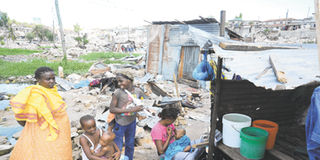Dar in humanitarian crisis over demolition

Residents of Kinondoni Mkwajuni in Dar es Salaam gather outside a makeshift house yesterday. The ongoing demolition of houses built in flood-prone, restricted areas and public space has left hundreds homeless. The surroundings in which they now live show all the signs of a possible outbreak of health and other related challenges. PHOTO|SALIM SHAO
What you need to know:
The area is covered with rubble and pieces of building materials such as iron sheets, nails and wood. Because of the demolition, pit latrines and sewers are now open issuing effluent that form small ponds all around the area. The smell is also intolerable.
Dar es Salaam. Twenty-two-year-old Hidaya Samatta, a mother of 9-month old twins, is suffering from sleepless nights since authorities pulled down her house at the Kinondoni Mkwajuni within the Msimbazi Valley in Dar es Salaam a fortnight ago.
“Raising baby twins in an open area in the scorching sun during the day and mosquito stings at night is a nightmare that I have never experienced in my life,” she told The Citizen yesterday.
Ms Samatta is among thousands of victims of the ongoing demolition who have been rendered homeless after the government, through the Kinondoni Municipal Council, the National Environment Management Council (Nemc) and the ministry of Lands, Housing and Human Settlements Development pulled down their houses.
Most of the victims say they now sleep in the open over rubble surrounded by stagnant dirty water and open sewers.
Yesterday, The Citizen visited Mkwajuni and witnessed about 300 people from various households stranded in the most squalid conditions possible. The victims say 500 more people spend the night in the area but go to their businesses during the day.
The area is covered with rubble and pieces of building materials such as iron sheets, nails and wood. Because of the demolition, pit latrines and sewers are now open issuing effluent that form small ponds all around the area. The smell is also intolerable.
People stranded in the area do not only have access to food, clean water and toilets but some do not have spare clothing because many houses were demolished while none of the items inside had been removed. Families have to place children and the elderly on makeshift houses made of loosely attached blocks and other building materials.
Because they sleep in the open they are prey to millions of mosquitoes and are easy targets of thieves who seek to steal even the little items they salvaged in the demolition.
Their main fear is rain, which would, definitely come with floods. Public health experts say it is just a matter of time before the outbreak of diseases such as cholera and malaria with serious consequences set in.
The residents reiterated to The Citizen yesterday that they have nowhere to go and that their lives have been paralysed and their families scattered.
They said that the government has forgotten that they were people who had nowhere else to go.
“My husband got high blood pressure after finding out that our house has been demolished. He has since been hospitalised. His relatives are taking care of him as I take care of the children,” said Ms Tatu Hussein, a victim.
She complained that almost all her belongings have been stolen and that she only managed to rescue water pales and that her children will no longer be able to attend classes once schools re-open next week.
She said it was surprising to learn from the government that they were living in a restricted area while they have been there for over four decades and have even been paying property tax, and that their house was even connected to other utilities like electricity and water.
“Someone should tell us why we are now being treated as if we are aliens and nobody seems to care,” lamented Mr Benard Nestory another victim.
No hope for immediate help
There are no immediate plans by either the government or humanitarian organisatiosn to avert the inevitable crisis.
Dar es Salaam regional commissioner Said Mecky Sadiki told The Citizen yesterday that the region had no “single parcel of land or single classroom” to temporarily accommodate the victims because there were too many of them.
“We are aware that a humanitarian crisis might be in the offing. But I have nowhere to take them. If we temporarily accommodate them in public schools, as some people have suggested, it would require so many classrooms to accommodate 8,000 households,” Mr Sadiki said.
This would disrupt the start of the new school term next week, he added.
Moreover, he noted, the people had been forewarned and that the demolition had to stop for two weeks to give them time to find alternative accommodation.
“When we gave them time to relocate, but they went to court, instead. They will only have themselves to blame,” Mr Sadiki noted.
Tanzania Red Cross Society deputy secretary general Peter Mlebusi also said they had no plans to help the victims because they were scattered.
“Had they been relocated to a single place we would have moved in to provide tents, food and other necessities like we did to the flood victims who were relocated to Mabwepande a few years ago,” he said.
But if they move now they would be required to find a place to relocate them, which the Red Cross does not have, he said.
“Now they are scattered all over the area where houses were demolished. It is, therefore, difficult to identify them and could lead to chaos,” Mr Mlebusi noted.
More than 350 houses have been demolished in the Dar es Salaam since the exercise began in mid- December in a continued plan by the government to pull down more than 8,000 houses along the Msimbazi River flood plain.
The High Court (Land Division) temporarily halted the exercise on Tuesday and sided with Mr Ali Kondo and six others who had filed an application on behalf of 674 others last week that the operation should exclude their houses until a representative suit they intend to file to challenge the exercise is heard and determined.




